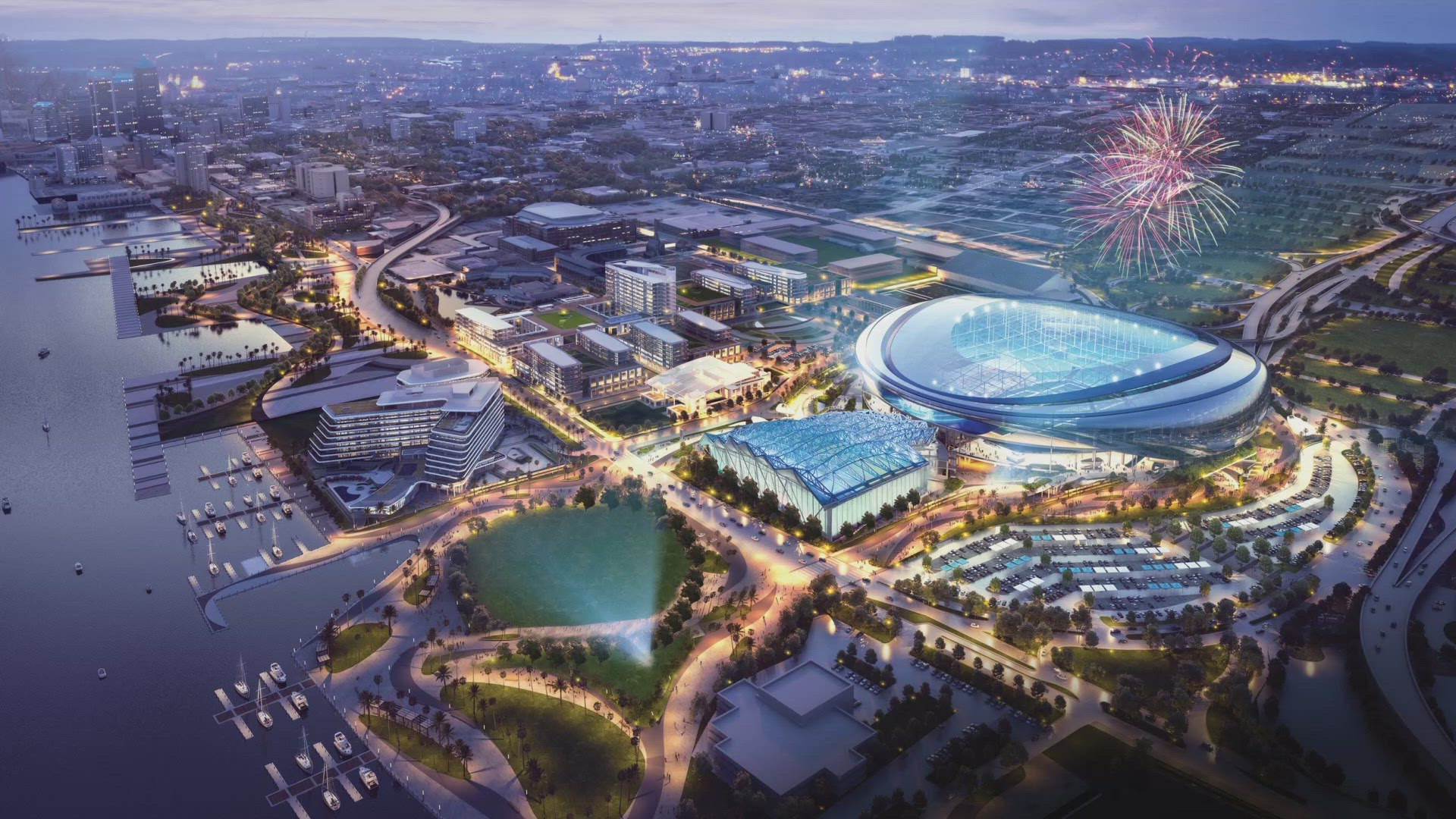JACKSONVILLE, Fla. — It's the biggest building project price tag in Jacksonville's history, but will it be approved by the city council?
The mayor's office and the Jaguars proposed a $1.4 billion stadium renovation plan that calls for more than $700 million to be contributed by the City of Jacksonville.
According to the plan that was presented the stadium renovations call for a 0.5% sales tax that has been on the books for 24 years - and was set to continue all the way to 2060 - to remain on the books to help fund the stadium. The Jaguars say this agreement will help the city save money down the road.
"Through this whole process, it's clear to me that the Jaguars have a love for this city," said Jacksonville Mayor Donna Deegan after the stadium agreement was presented.
The goal is for the Jaguars to begin playing inside of their completely renovated stadium in time for the 2028 season, and according to the presentation the team and the mayor's office made to city council, they believe they can get the funds without raising taxes on Jacksonville's citizens.
The Better Jacksonville Plan is a $2.25 billion growth management program that was approved by the voters back in 2000 and has been funded by a 0.5% sales tax increase while it's been in use for 24 years to finance the building of public facilities and infrastructure improvements.
The plan was supposed to end in 2030 but there was a proposal to end the plan early in order for the 0.5% tax to fund police, fire and city worker pensions.
However, the Stadium of the Future plan calls for the Better Jacksonville Plan to remain open until 2030 in order to continue paying for infrastructure projects so that the city's $625 million portion of the stadium funding can be taken from a $1.3 billion reserve that it has in its Capital Improvement Plan.
Mike Weinstein, the city's lead stadium negotiator said this plan will help pay for the stadium and still fund the pensions on their original timeline.
"There's no change or detriment or fear of the pensions not getting what they were originally supposed to get to be fully funded," said Weinstein. "There's no money coming out of a pension program, the only thing it does is put it back to what it was originally approved."
"This was a binary choice, we could build the stadium or we could lose our team and that's not going to happen on my watch," said Deegan.
Weinstein said this plan would also reduce the amount of money the city has to borrow for other projects and reduce the city's debt payment in future years.
That money should help the city fund its $625 million portion of the stadium renovation bill, which is equal to the Jaguars' portion. Jaguars President Mark Lamping said the city's payment burden won't rise.
"One of the substantial benefits to the agreement as it relates to protecting the taxpayers in an environment of significant cost overruns, the Jaguars are at risk for that at 100%," said Lamping.
Under the current stadium lease it costs $20 million for stadium maintenance and utilities, of which the city pays 67.6% of those total bills.
However, under the new agreement the city will only pay for slightly more than 15% of maintenance and utility costs, while more than 25% of those costs will come from NFL surcharges and profits from non-NFL events like the Luke Combs concert, which was held in EverBank Stadium.
"We also have to give those promoters and the touring companies who have bought those tours confidence that people will show up for those concerts and pay the prices they could get in other markets," said Lamping.
Another benefit to the city would be a reduction in gameday operating costs by nearly $6 million. According to Lamping, the city would only have to pay the bill for increased police and firefighters on gamedays while the Jaguars would pay the 80% of the gameday operating costs.
But those reduced costs hinge on whether the city council approves the deal and City Councilmember Rory Diamond said he isn't ready to rubberstamp the agreement.
"This is what it costs, there are tradeoffs," said Diamond. "We want to do all these things in Jacksonville, they want brand new parks and all this other stuff, you can't just have everything that you want on the list, you have to make some decisions."
If the city council approves the deal by its second meeting of June, which is scheduled for June 25th, then the Jaguars believe they can take it to the NFL owners for approval during their meeting scheduled for this October. If 75% of NFL owners approve the deal then construction could begin in February of 2025 with the stadium tentatively opening for the 2028 season.
To learn more about the Stadium of the Future plan, click here.

